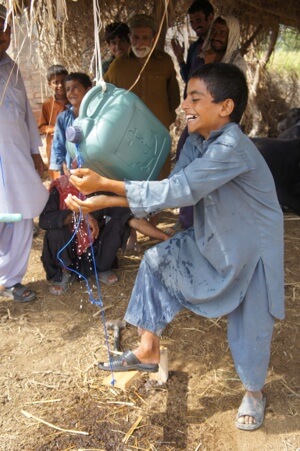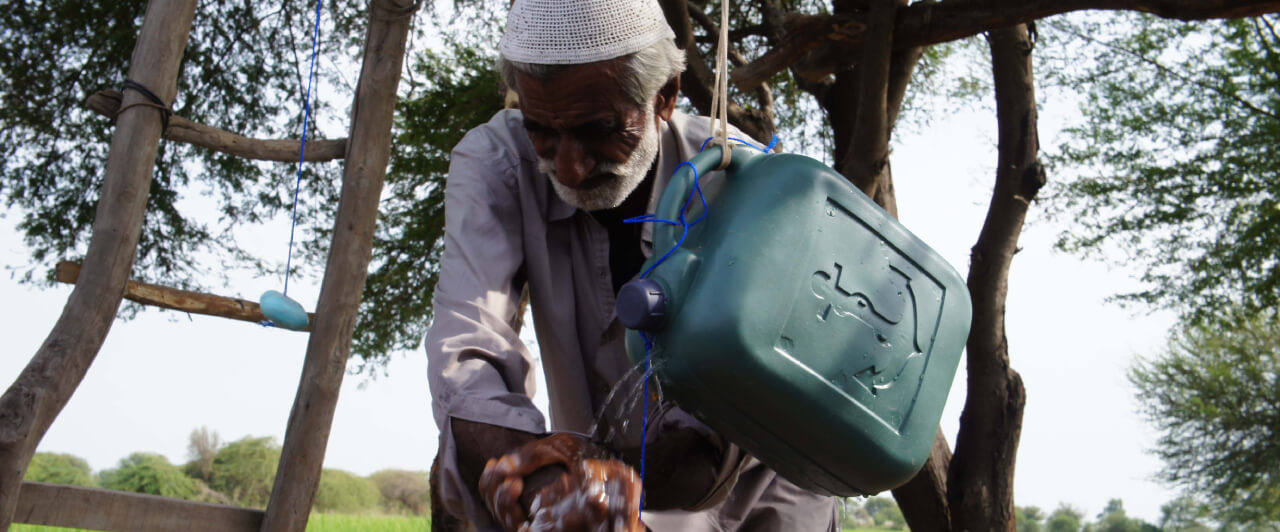 Preventing infectious illnesses
Preventing infectious illnesses
through innovative mobile sinks
After using the toilet and before eating - do not forget to wash your hands! Almost every German kindergarten child knows this saying, so hand washing becomes a habit for them very quickly. But in the rural areas of Pakistan, there are not enough schools and kindergartens - and knowledge of this behaviour is often not available. In many areas there is also a large water shortage. Personal hygiene is often neglected. Kids are bathed in streams and ponds. These are also used for washing clothes and as a cattle trough. Quite often you see the kids swimming in their mother's lavatories. Toilets and washing areas, however, are rarely seen. The way pathogens travel are, for example, on hands, water or food for humans, which all often result in infectious diseases.
Necessity
Better hygience care for the population
Activity
Construction of hand washing stations.
Countable effort
Number of hand washing stations that are built
Result
Measurable reduction of respiratory and diarrheal diseases especially among children. Measurable decrease in sickness absence days in school.
Systemic effect
Reduction of child mortality due to infectious diseases and improved health in the population
Background
According to the United Nations, 3.5 million children die each year from acute respiratory diseases. 1.5 million children under the age of 5 die each year as a result of diarrheal diseases. According to UNICEF, 40 % of deaths from diarrheal diseases and 25 % of deaths from respiratory diseases can be prevented by proper hand washing with soap. Thus, hand washing with soap is the most effective method to reduce the high infant mortality due to diarrhea and respiratory diseases. Nevertheless, washing hands with soap at the critical times (ie, before eating / preparing food , after using the toilet ) is extremely low worldwide. People with weakened immune systems ( children, pregnant women, the elderly, the sick ) are particularly vulnerable to infections by germs. Therefore, education on the problem and creating access to washing facilities are necessary to protect children in the future. Studies show that educational events in schools significantly reduce the risk of infections and reduce the number of days of absence by up to 50 %.
The good deed
Mobile sinks are an easy instrument for washing hands with soap that can be built from local materials using simple tools. It is very water efficient, very cost effective and can always be rebuilt or repaired by the population. There are no follow-up costs after project completion. The target group will design the Tippytap itself and according to its own needs and preferences, thus the sense of responsibility will be strengthened.
Challenge
Hand washing should be a habit. Educational activities for the whole family are important to change old habits. Higher consciousness and the possibilities for hand washing is an important first step, but such practices have to be practiced and pass into the people's habits. The challenge therefore lies in a long-term behavior change.

AboutPakistan
Islamabad
Capital
184,662,000 (2013)
Number of inhabitants
1,296
Gross domestic product per capita per year
146
Human Development Index
5 of the world's 14 eight-thousanders are located on Pakistani territory, including K2 and Nanga Parbat. In northern Pakistan the Hindu Kush, the Karakoram and the Himalayas, the three highest mountain ranges in the world, meet.
About the organization and further information
Association
Action Medeor
DZI seal of approval, member of the German donation eV, price transparency PWC 2012




